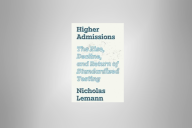You have /5 articles left.
Sign up for a free account or log in.
WASHINGTON -- Roman Catholic colleges have emerged as a leading voice for undocumented students in recent years, admitting students brought to the U.S. by their parents illegally as children, helping them pay for their education and publicly advocating for changes to U.S. immigration law to give them permanent legal residency.
Even at colleges that go out of their way to help those students, though, support systems can be patchy, liable to fall apart if a key staff member leaves, according to a survey of Jesuit colleges and universities released today by a team of researchers from three such colleges. The report, a survey of undocumented students at Jesuit colleges, as well as staff members and a few key community figures, encourages colleges to do more and lists some “best practices” in working with undocumented immigrant students.
The study, funded by the Ford Foundation, conducted in-depth interviews with 26 students at six Jesuit colleges and universities, as well as more than 110 staff members, asking about campus atmosphere, financial aid and other problems undocumented students might encounter. Research began in 2010 and concluded last year, meaning some of the interviews were conducted before a change in U.S. policy allowed thousands of undocumented students to get work authorization and avoid deportation.
Still, the researchers -- a team of professors and staff from Fairfield University, Loyola University Chicago and Santa Clara University -- said they found undocumented students live in an atmosphere of “fear and uncertainty” despite the policy change. Many obstacles, such as the lack of a path to citizenship, would require Congressional action -- and the report’s authors will make a presentation on their findings today on Capitol Hill, amid growing attention to immigration in Washington.
But the report also addresses problems that colleges might be able to solve. “They’re really like any first-generation college students: Their family is really not able to help them navigate the system,” said the Rev. Richard Ryscavage, director of the Center for Faith and Public Life at Fairfield University and the project director for the study. “For them it’s even more peculiar. They need help and career guidance.”
Undocumented students are often referred to Jesuit colleges by an informal support network: a parish priest might know someone in the admissions office, or a high school counselor with an acquaintance in the financial aid department. While that network can pass along information about which colleges are most willing to help undocumented students, it can also fall apart quickly if the key staff members leave or are assigned to other jobs.
Other faculty and staff might not even be aware there are undocumented students on their campus, given that many were raised in the U.S. and are indistinguishable from American college students, Father Ryscavage said. The study’s authors recommend designating admissions staff to work with undocumented students and providing training to all staff members. Some staff should focus specifically on the legal issues undocumented students might face, they said.
In some cases, professors and others want to help undocumented students but aren’t certain what is legal, Father Ryscavage said. He said some faculty have asked whether they could offer those students some kind of compensation in exchange for work on campus, even though they can’t work legally and are ineligible for work-study.
The authors also recommend increased social support for undocumented students, including entrance and exit counseling. Until the policy change last summer, undocumented students knew they would not be able to work legally in the U.S., and those complications continue to affect students’ choices on majors and future careers, the authors wrote.
While the authors focused on Jesuit colleges, many of the recommendations apply to non-Catholic colleges and universities as well, the authors said. But Catholic colleges, and especially Jesuit colleges, should be prepared to explain and defend working with undocumented students in the context of their religious mission, they argue.
Many Jesuit colleges were founded in neighborhoods filled with recent Catholic immigrants, and they should not lose sight of that original mission, said Kurt Schlichting, a professor of sociology and anthropology at Fairfield University and the study’s research director. The report suggests that "Jesuit higher education has lost its special connection with immigrants now that their student profile has dramatically changed.”
The report calls on Jesuit colleges to make clear -- in their mission statements, viewbooks and other materials -- that their commitment to access for all students includes those who are not citizens. The colleges should also publicize their support for undocumented students, and be prepared to explain that offering financial aid to those students, who are ineligible for federal financial aid, is considered part of their mission.
In an era of tight financial aid budgets, that can be a politically difficult choice to defend, the authors said. In some cases, donors will try to give money that can only be used for scholarships for U.S. citizens. (In some cases, the opposite is true; the Jesuit community at Santa Clara University offers a scholarship for undocumented students, although it’s described as a scholarship for students with “extraordinary life circumstances and needs.”)
One solution the authors suggested: a “common fund” for grants to support undocumented students at all Jesuit colleges. A slight majority (58 percent) of staff surveyed said they thought their institution would support such a fund, and 5 percent disagreed.
The next step is trying to get more institutions to implement the best practices suggested in the report, Father Ryscavage said. “We hope we will have some influence,” he said. “We really feel there’s still a lot of ignorance about these students -- who they are, what they’re struggling with, the challenges they’re facing.”








